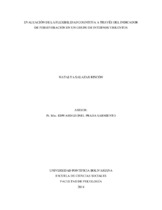| dc.contributor.advisor | Director. Prada Sarmiento, Edward Leonel | |
| dc.contributor.author | Salazar Rincón, Natalya | |
| dc.coverage.temporal | 2014 | |
| dc.date.accessioned | 2022-05-04T17:04:53Z | |
| dc.date.available | 2022-05-04T17:04:53Z | |
| dc.date.issued | 2014-03 | |
| dc.identifier.uri | http://hdl.handle.net/20.500.11912/10019 | |
| dc.description | 62p.: (pdf); il; tablas. | spa |
| dc.description.abstract | El comportamiento violento ha sido explicado desde diferentes disciplinas y desde enfoques teóricos variados. Dentro de la perspectiva neuropsicológica se ha sugerido que es muy posible que fallas en las funciones ejecutivas resulten en la manifestación de conductas agresivas y violentas que pueden ser consideradas dentro del marco legal como delitos. Principalmente, un proceso que se ha reportado en la literatura como determinante para la regulación de la conducta es la flexibilidad cognitiva, que a su vez, es importante para la adaptación social. El presente estudio pretendió describir el desempeño en una tarea de flexibilidad cognitiva de un grupo de internos condenados por delitos de tipología violenta. Se enmarca como un estudio de tipo pre-experimental de enfoque cuantitativo. Mediante el uso del Test de Clasificación de Tarjetas de Wisconsin (WCST) se implementó el proceso de evaluación. Se destacan como resultados del presente estudio un desempeño pobre en el indicador de perseveración, el cual mide la flexibilidad cognitiva, permitiendo sugerir que dicha función se encuentra afectada en la muestra evaluada. Como perspectiva se pretende continuar con estudios que permitan valorar la relación entre la flexibilidad cognitiva, otras funciones ejecutivas y la conducta violenta. Así mismo se sugiere la evaluación de factores psicosociales que están relacionados con la agresión. | spa |
| dc.description.abstract | Violent behavior has been explained from different disciplines and from different theoretical approaches. Within the perspective Neuropsychological it has been suggested that it is very possible failures in executive functions are resulting in the manifestation of aggressive and violent behaviors that can be considered within the legal framework as crimes. Mainly, a process that has been reported in the literature as a determinant for the regulation of the conduct is cognitive flexibility, which in turn, is important for social adaptation. The present study sought to describe the performance on a task of cognitive flexibility of a group of prisoners convicted of crimes of violent type. It is framed as a prior study of the quantitative approach. The evaluation process was implemented using the Wisconsin Card Sorting Test (WCST).A poor performance at the indicator of perseveration, which measures cognitive flexibility, allowing suggest that this feature is affected in the evaluated sample stand out as results of the present study. As perspective intends to continue with studies that allow to evaluate the relationship between the cognitive flexibility, other executive functions and conduct violent. Likewise suggested the evaluation of other psychosocial that are associated with aggression. | eng |
| dc.format.mimetype | application/pdf | |
| dc.language.iso | spa | |
| dc.publisher | Universidad Pontificia Bolivariana | spa |
| dc.rights | Attribution-NonCommercial-NoDerivatives 4.0 International | * |
| dc.rights.uri | http://creativecommons.org/licenses/by-nc-nd/4.0/ | * |
| dc.subject | Psicología | spa |
| dc.subject | Violencia conyugal | spa |
| dc.subject | Agresividad (Psicología) | spa |
| dc.subject | Pruebas psicológicas | spa |
| dc.subject | Cognición | spa |
| dc.title | Evaluación de la flexibilidad cognitiva a través del indicador de perseveración en un grupo de internos violentos | spa |
| dc.type | Trabajo de grado | spa |
| dc.publisher.department | Escuela de Ciencias Sociales | spa |
| dc.publisher.program | Psicología | spa |
| dc.type.hasVersion | publishedVersion | spa |
| dc.description.sectional | Bucaramanga | spa |
| dc.description.degreename | Psicólogo | spa |


